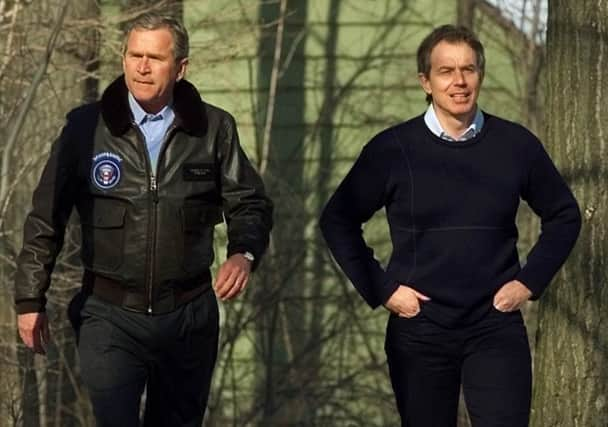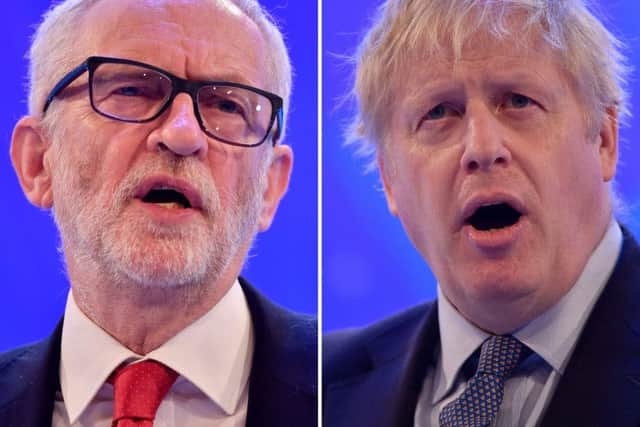Our Orwellian post-truth political rot set in with Tony Blair and Iraq: Anthony Clavane


George Orwell’s dystopian masterpiece should be compulsory reading for all our political leaders.
Written 70 years ago, the book could not be more relevant in a General Election campaign which has tried to persuade us that black is white, war is peace and retaining 19,000 existing nurses is the same thing as hiring 19,000 new ones.
Advertisement
Hide AdAdvertisement
Hide AdIn the Orwell novel, a superstate urges the public to reject the evidence of its own eyes and ears.


The ruling party creates an alternate reality based on the gross distortion of facts, routinely trotting out falsehoods in order to gain a political advantage.
Sound familiar?
In this post-truth election lying has become the norm. In one of the previous TV debates, presenter Julie Etchingham asked: “Does the truth matter in this election?”
When Johnson replied “I think it does”, the studio audience laughed.
Advertisement
Hide AdAdvertisement
Hide AdSuch disdain for the Prime Minister’s answer at least shows that the electorate will not be so easily duped.
It knows that, whether part of the Conservative, Labour or Lib Dem tribe, politicians have, at best, a loose relationship with the truth.
At worst they appear to happily generate a fog of lies. This is hardly a new phenomenon.
Perhaps the rot set in when Labour prime minister Tony Blair led the country to war with Iraq in 2003 on a false prospectus.
Advertisement
Hide AdAdvertisement
Hide AdThe case for war centred around a reportedly “sexed up” intelligence dossier to fit with American claims relating to Iraq’s supposed ability to access weapons of mass destruction.
Britain went to war alongside America despite mass public protests - only for it to be eventually revealed that Saddam Hussein and Iraq had not in fact possessed WMDs; poisoning trust in our politicians.
A great deal of both the Leave and Remain propaganda from the 2016 referendum was seemingly penned on a desk from within the Ministry of Truth.
Who can forget the preposterous promise of £350m a week for the NHS on the side of that red Brexit bus?
Advertisement
Hide AdAdvertisement
Hide AdBut the electioneering carried out by all parties these past few weeks has really taken the biscuit.
As The Financial Times has noted, it has been “a dismal campaign notable for its use of casual falsehoods and fakery, and its further coarsening of British political debate.”
There appears to be no single truth grounded in fact. Instead we are subjected to competing versions of the truth.
The Tories declare they will build 40 new hospitals when it appears they only intend to refurbish half a dozen.
Advertisement
Hide AdAdvertisement
Hide AdLabour’s manifesto pledge that 95 per cent of taxpayers will not pay any more in income tax, VAT or National Insurance has been challenged by a fact-checking organisation which points out that scrapping the marriage allowance and reversing cuts to inheritance tax will lead to indirect tax rises.
And, as for Jo Swinson’s holier-than-thou party, the old adage applies: “There are three kinds of lies: lies, damned lies and Lib Dem bar charts.”
Their misuse of data in election leaflets, alongside their fake newspaper-style publications, has become the stuff of legend.
As the columnist Michael O’Donnell has written: “Nineteen Eighty-Four remains the book we turn to when truth is mutilated, when language is distorted, when power is abused, when we want to know how bad things can get.”
Advertisement
Hide AdAdvertisement
Hide AdSince its publication in 1949, it has been adapted for stage and screen, opera and ballet, comic book and rock album.
Almost three years ago, Donald Trump’s press secretary told a notorious porkie about the president’s inauguration, insisting it was the “largest audience to ever witness” such an event.
When Trump’s adviser Kellyanne Conway a few days later described the statement as “alternative facts” – or, in layman’s language, an outright lie – US sales of Orwell’s classic novel rocketed by 10,000 per cent.
A week today, when we find out the result of the most unedifyingly dishonest election of recent times, don’t be surprised if Nineteen Eighty-Four is announced as the No 1 bestseller in the UK.